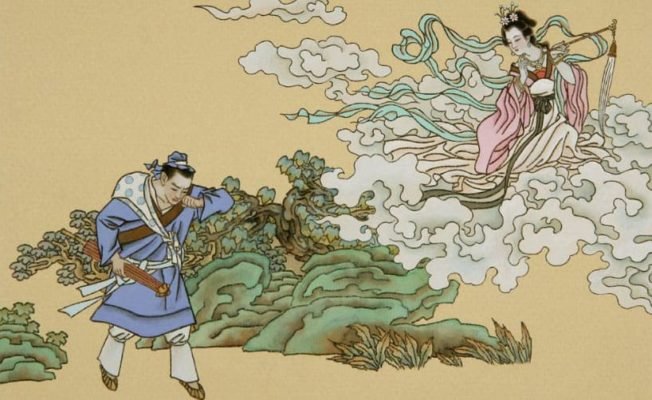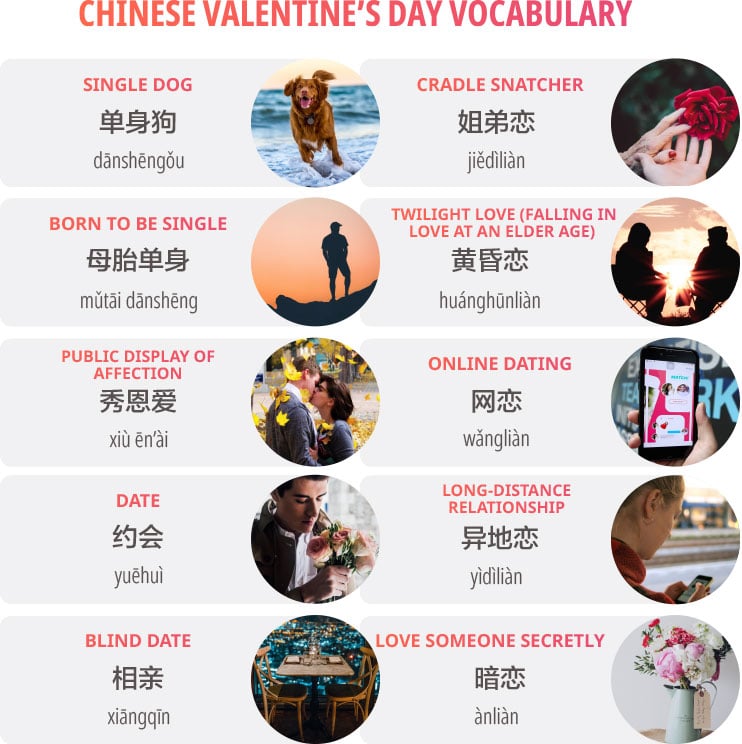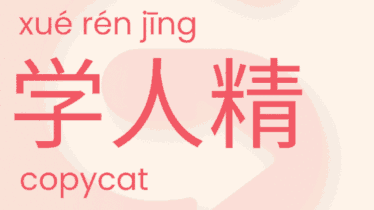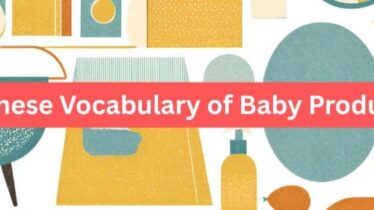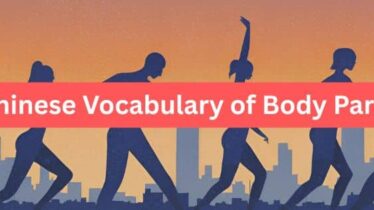Terms about Chinese Valentine’s Day
The 7th day of the 7th lunar month: Chinese valentine’s day: Qīxì 七夕. Here’s some handy vocab to guide you through it, whether you’re going on a date in Shanghai or crossing bridges made of magpies. (Read on, it’ll make sense.)
About Qīxì 七夕
China’s Qixi festival celebrates the story of the cowherd and the weaver girl, a sort of Chinese Romeo & Juliet (written long before Shakespeare was born).
The 2600 year old story states that the cowherd and the weaver girl weren’t allowed to be together and were banished to opposite sides of the heavenly river (the Milky Way). But once a year, on the 7th day of the 7th lunar month, a flock of birds would form a bridge so that the lovers could be together for one day.
This is one of the most famous poems by Qin Guan goes (in English) like this:
“Immortal at the Magpie
Bridge Clouds float like works of art, stars shoot with grief at heart. Across the Milky Way the Cowherd meets the Maid. When Autumn’s Golden Wind embraces Dew of Jade, All the love scenes on earth, however many, fade. Their tender love flows like a stream; Their happy date seems but a dream. How can they bear a separate homeward way? If love between both sides can last for aye, Why need they stay together night and day?”

12 Sweet Pick-up Lines in Chinese
- wǒ zǎo shàng xǐng lái yǒu liǎng gè yuán yīn :nào zhōng hé nǐ 。
我 早 上 醒 来 有 两 个 原 因 : 闹 钟 和 你 。
There are two reasons why I wake up in the morning: alarm clock and you. - wǒ jué de nǐ xiàng wǒ de yí gè qīn qi
我 觉 得 你 像 我 的 一 个 亲 戚 ,
nǐ xiàng wǒ bà de nǚ xù
你 像 我 爸 的 女 婿。
I think you look like a relative of mine.
You look like my father’s son-in-law. - “ nǐ shì shén me xuè xíng ? ”
“ 你 是 什 么 血 型 ? ”
“ b xíng 。 ”
“ b 型 。 ”
“ bú shì , nǐ shì wǒ de lǐ xiǎng xíng ”
“ 不 是 , 你 是 我 的 理 想 型 。 ”
“What’s your blood type?”
“B.”
“No, you are my type.” - bù hǎo yì si , wǒ kě yǐ xiàng nǐ wèn lù ma ?
不 好 意 思 , 我 可 以 向 你 问 路 吗 ?
nǐ yào qù nǎ lǐ ?
你 要 去 哪 里 ?
qù nǐ xīn lǐ 。
去 你 心 里 。
Excuse me, may I ask you the way?
Which way?
The way to your heart. - zuì jìn yǒu yáo yán shuō wǒ xǐ huān nǐ
最近有谣言说我喜欢你
wǒ yào chéng qīng yī xià
我要澄清一下
nà bù shì yáo yán.
那不是谣言。
Recently there’s been a rumor that I like you.
Let me clarify:
It’s not a rumor. - “nǐ zuì jìn shì bú shì yòu pàng le?”
“你最近是不是又胖了?”
“méi yǒu ā, wèi shén me zhè me shuō?”
“没有啊,为什么这么说?”
“nà wèi shén me, zài wǒ xīn lǐ de fèn liàng yuè lái yuè zhòng le?”
“那为什么,在我心里的分量越来越重了?”
“Have you gained weight recently?”
“No, why do you say that?”
“Then why is your presence in my heart growing heavier?” - nǐ zhī dào nǐ hé xīng xīng yǒu shén me qū bié ma?
你知道你和星星有什么区别吗?
xīng xīng zài tiān shàng, nǐ zài wǒ xīn lǐ.
星星在天上,你在我心里。
Do you know the difference between you and the stars?
The stars are in the sky, and you are in my heart. - cāi cāi wǒ de xīn zài nǎ biān?
猜猜我的心在哪边?
zuǒ biān?
左边?
cuò le, zài nǐ nà biān.
错了,在你那边。
Guess where my heart is?
On the left side?
Wrong, it’s on your side. - nǐ wén dào shén me wèi dào le ma?
你闻到什么味道了吗?
méi yǒu ā
没有啊
zěn me nǐ yī chū lái kōng qì dōu shì tián de le
怎么你一出来空气都是甜的了
Did you smell something?
No, I didn’t.
How come the air turned sweet as soon as you appeared? - nǐ lèi bù lèi ā?
你累不累啊?
bù lèi.
不累。
kě shì nǐ dōu zài wǒ nǎo lǐ pǎo le yī tiān le
可是你都在我脑里跑了一天了
Are you tired?
No, I’m not.
But you’ve been running through my mind all day. - “nǐ néng bù néng bì zuǐ?”
“你能不能闭嘴?”
“wǒ méi yǒu shuō huà ā”
“我没有说话啊”
“nà wèi shén me wǒ mǎn nǎo zi dōu shì nǐ de shēng yīn”
“那为什么我满脑子都是你的声音”
“Can you be quiet?”
“I didn’t say anything.”
“Then why is my mind full of your voice?” - nǐ zhī dào wǒ wèi shén me gǎn mào ma?
你知道我为什么感冒吗?
yīn wèi zháo liáng le?
因为着凉了?
bù, yīn wèi wǒ duì nǐ wán quán méi yǒu dǐ kàng lì.
不,因为我对你完全没有抵抗力。
Do you know why I caught a cold?
Because you caught a chill?
No, because I have no resistance to you.
Love quotations from Chinese poetry
情不知所起,一往而深。
Qíng bù zhī suǒ qǐ, yī wǎng ér shēn.
Love, without knowing its origin, deepens unwaveringly.
By 汤显祖 (Tang Xianzu, 1550 – 1616)
天涯海角有穷时,只有相思无尽处。
Tiānyá hǎijiǎo yǒu qióng shí, zhǐyǒu xiāngsī wú jìn chù.
There is an end to the earth’s corners and the sea’s edges, but there is no end to longing.
By 晏殊 (Yan Shu, 991–1055)
相思本是无凭语,莫向花笺费泪行。
Xiāngsī běn shì wú píng yǔ, mò xiàng huā jiān fèi lèi háng .
Longing is, after all, a baseless word; do not waste tears on flowered paper.
By 晏几道 (Yan Jidao, 1038–1110)
与君结欢爱,自比金石坚;金石终不渝,欢爱终不疏。
Yǔ jūn jié huān ài, zì bǐ jīn shí jiān; jīn shí zhōng bù yú, huān ài zhōng bù shū.
With you, I form a bond of love, as strong as metal and stone; metal and stone do not change, and neither does our love.
By 朱熹 (Zhu Xi, 1130–1200)
Happy Chinese Valentine’s day!
七夕快乐!Qīxī kuàile!
